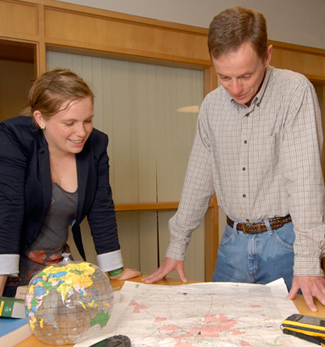Instructional & Media Services has a full time GIS Specialist on our staff to support GIS projects in all disciplines. Our specialist, Jim Ciarrocca, is available for consultations on possible projects. Here are a few examples of past GIS workshops.
Introduction to GIS
GIS (Geographic Information System) is a way of capturing, analyzing, and displaying data in a spatial manner. While Google Earth may be able to perform some of these functions, ESRI, the GIS software supported on campus, allows for the entry and analysis of much larger and sophisticated data sets. Faculty in Geology and Environmental Studies are already using this software for their classes or research. This workshop will demonstrate how faculty from other departments across the curriculum can use GIS to display information spatially in a manner that is accessible for everyone.
GIS: Making Simple Maps
In this introductory workshop we will explore using geographic information system (GIS) software from ESRI to build a simple map. We will start with a predefined lesson and data set. Tasks will include layering the data onto a base map, classifying and symbolizing the information, adding a title and legend, and saving the finished map in a format suitable for publication.
Introduction to Spatial Literacy
Understanding how to think about problems and concepts in a spatial context is a fundamental skill that is not well taught in the American educational system. Often referred to as “Spatial Literacy”, this type of thinking focuses on understanding the importance of geographic space, and the relationships formed by this space. Spatial Literacy is not a stand-alone subject, but rather it is a way of thinking that cuts across all fields of studies, and is becoming increasingly important as a necessary skill for liberal arts graduates across all disciplines. A powerful technology for engaging spatial thinking is called Geographic Information Systems (GIS), which provides sophisticated tools for collecting, managing, analyzing, and visualizing spatial data.
Google Earth allows users to embed and display information on top of a representation of the world created via satellite photos. In this workshop we’ll go over basic navigation of the Google Earth interface, as well as Google sponsored layers, including historical maps and government data bundled with the latest release of Google Earth. Finally, we’ll demonstrate how you can enter your own text and images, and then attach them to a location.






